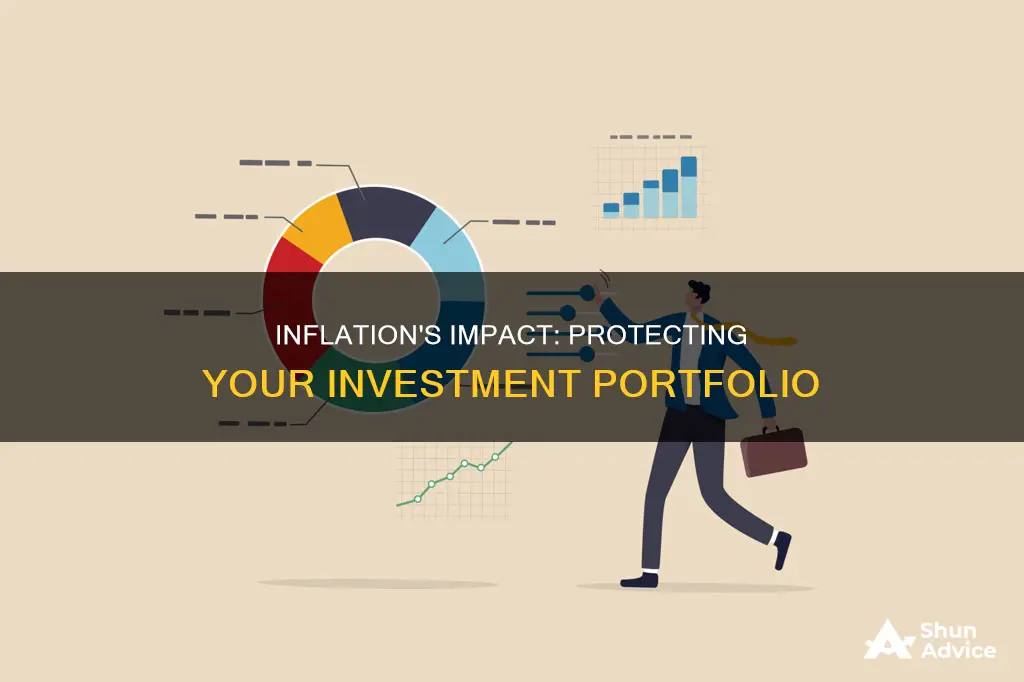
Inflation is a sustained trend of increasing prices over time, which leads to a decrease in purchasing power. It can have a detrimental effect on investment portfolios, eating away at returns and making it difficult for assets to produce a positive return. Inflation can also negatively impact stocks, as it becomes challenging to gauge a company's future earnings. However, some investments, such as real estate and commodities, tend to have a positive relationship with inflation and can be used as a hedge. Understanding the relationship between inflation and investments is crucial for making informed decisions, and investors should consider diversifying their portfolios to minimise the impact of inflation.
| Characteristics | Values |
|---|---|
| Impact on stocks | Stocks are volatile investments, and stock prices can be affected by inflation. Stocks in the energy sector may be better at keeping up with inflation than stocks in the tech sector. |
| Impact on bonds | Bonds are considered a more stable investment opportunity than stocks but with lower returns. Bonds often cannot keep up with inflation as they are debt-based and lock in a specific interest rate. |
| Impact on alternative investments | Investments in real estate, precious metals, and commodities (such as crude oil, natural gas, grains, and other agricultural products) can help diversify your portfolio and are thought to generally keep up with inflation. |
| Impact on savings | Inflation can shrink your savings as it diminishes your buying power. |
| Impact on fixed-income securities | Inflation can significantly reduce real returns on fixed-income investments such as corporate or municipal bonds, treasuries, and CDs. |
| Impact on purchasing power | Inflation decreases your purchasing power as the same amount of money buys fewer goods and services. |
| Impact on investment returns | To earn a real return, nominal interest rates must keep up with or outpace inflation. Investments with lower interest rates are more affected by inflation. |
| Impact on nominal and real interest rates | The nominal interest rate is the rate without adjustment for inflation. The real interest rate is the nominal interest rate minus the rate of inflation, showing your actual gain or loss in purchasing power. |
| Impact on cash and cash equivalents | Cash and cash equivalents are heavily affected by inflation as they generate little to no interest to compete with the rate of inflation. |
What You'll Learn

Inflation and stocks
Inflation can have a significant impact on stocks and investment portfolios. While stocks are generally considered to be more volatile than bonds, not all stocks are able to offset high inflation rates. For instance, stocks in the energy sector may be better equipped to keep up with inflation compared to stocks in the tech sector, as energy costs are directly linked to inflation. Consumers may choose to forego purchasing the latest tech gadgets, but they cannot easily avoid paying for energy.
During periods of high inflation, investors often seek alternative investments, such as real estate or commodities, which are believed to be effective hedges against inflation. Real estate investments, through income-producing properties or real estate investment trusts (REITs), can provide exposure to a different sector of the economy, and real estate values are generally thought to keep pace with inflation. Similarly, commodities such as precious metals, crude oil, natural gas, and agricultural products tend to rise with inflation and are thus viewed as attractive investments during inflationary periods.
When it comes to stocks, certain sectors tend to outperform others during inflationary times. The energy sector, for example, is closely tied to the Consumer Price Index (CPI), a key measure of inflation. As energy prices fluctuate, they have a direct impact on the CPI. Since consumers typically cannot reduce their energy consumption significantly, even with higher prices, the energy sector is well-positioned to perform well during inflationary periods.
On the other hand, growth stocks, which typically have minimal cash flow, may struggle during challenging economic times. When inflation is high, consumers may need to adjust their spending habits to cover essential needs, making it more difficult for companies without an essential service offering to survive. Consequently, growth stocks are likely to experience a more substantial impact from inflation.
In summary, while stocks can provide a hedge against inflation, not all sectors are equally resilient. Investors should carefully consider the potential impact of inflation on their stock portfolios and make adjustments as necessary to mitigate the negative effects of inflation on their investments.
Saving and Investing: Your Path to Financial Freedom
You may want to see also

Inflation and bonds
Bonds are loans issued by a corporate or government entity when they need capital. The investor who purchases bonds is lending money to the issuer of the bond. The bond pays interest to the investor, and the issuer is supposed to pay back the principal in full when the bond matures.
Bonds are often considered a more stable investment opportunity than stocks. The lower risk associated with bonds makes them more stable, but the lack of risk also leads to lower returns. When inflation is high, bonds often cannot keep up. This is because bonds are debt-based, and they usually lock in a specific interest rate. So when a country's central bank raises interest rates to combat inflation, the real yield drops for existing bonds.
However, there is an exception to this rule. Treasury Inflation-Protected Securities (TIPS) are bonds specifically designed to keep pace with inflation. After purchasing a TIPS bond, the principal will increase with inflation and decrease with deflation. The changes are made based on the Consumer Price Index (CPI), and interest is paid out twice a year at a fixed rate.
Inflation erodes the real value of a bond's face value, which is a particular concern for longer-maturity debts. The higher the current rate of inflation and the higher the expected future rates of inflation, the higher the yields will rise across the yield curve, as investors will demand a higher yield to compensate for the inflation risk.
In an environment of high inflation, investors may need to consider allocating more assets to equities, which have shown a more durable ability to outpace inflation. However, bonds can still be a valuable investment for older investors nearing retirement who are more comfortable with stable, lower-risk investments.
Saving and Investing: Pros, Cons, and Your Money
You may want to see also

Inflation and savings
Inflation can have a detrimental effect on your savings. Even if you have secured your funds in a savings account with an average interest rate, your savings can shrink. For example, if you need $45,000 per year to sustain your current lifestyle and the annual inflation rate is 3%, in 30 years you'll need around $109,000 to maintain the same purchasing power.
The impact of inflation on your savings is more pronounced if you have a low-interest savings account, money market fund, or certificate of deposit (CD). Inflation reduces your purchasing power, and if the interest rate on your savings is lower than the inflation rate, you are effectively losing money over time.
During periods of high inflation, it is not advisable to hold cash. Instead, investing in assets such as stocks and bonds can be a better option as their returns can outpace inflation. Inflation-protected securities such as inflation-indexed bonds or Treasury Inflation-Protected Securities (TIPS) are designed to keep pace with inflation and are immune to inflation risk.
To protect your savings from the effects of inflation, it is important to monitor your savings against inflation and ensure your earnings keep up with inflation. Diversifying your portfolio can also help reduce the impact of inflation on your savings. This involves investing in a range of asset types, such as TIPS and real estate, while reducing exposure to investments that typically underperform during inflation, such as growth stocks and long-term bonds.
While inflation can erode the value of your savings, it is important to remember that it is just one factor to consider when planning your finances. Your risk tolerance, investment goals, and economic conditions will also play a role in determining the best strategies to protect your savings.
Labor-Saving Equipment: Worth the Investment for Automotive Division?
You may want to see also

Inflation and risk tolerance
Inflation can have a significant impact on investment portfolios, and it's important to understand how it might affect your investments based on your risk tolerance. Here are some key points to consider:
Impact of Inflation on Investments:
Inflation erodes purchasing power over time, and this includes the value of investments. Inflation can affect different types of investments in various ways:
- Stocks: Stocks are generally considered good investments to combat inflation over the long term. However, during periods of high inflation, stocks can be volatile as stock prices are based on investor expectations of future earnings, which can be challenging to predict during inflationary times.
- Bonds: Inflation and interest rates are often linked, and when inflation is high, interest rates tend to rise. This can negatively impact bonds, especially those with fixed interest rates, as the real yield or return on these investments may not keep up with inflation.
- Real Estate: Real estate can be a good inflation hedge, especially income-generating properties. As demand for housing increases, rent prices tend to rise, helping real estate investments keep pace with inflation.
- Commodities and Precious Metals: Investments in commodities such as crude oil, natural gas, grains, and precious metals like gold and silver are often seen as hedges against inflation as their prices tend to rise during inflationary periods.
Risk Tolerance and Investment Strategies:
Understanding your risk tolerance is crucial when navigating inflationary environments. Here are some considerations:
- Risk Tolerance and Asset Allocation: Your risk tolerance will influence the types of assets you choose for your portfolio. If you have a lower risk tolerance, you may prefer more stable and predictable investments, such as bonds or income-generating real estate. On the other hand, if you have a higher risk tolerance, you may be more comfortable with volatile stocks or growth-oriented investments.
- Diversification: Diversifying your portfolio across different asset classes and sectors can help mitigate the impact of inflation. This ensures that you are not overly exposed to any single investment that may be negatively affected by inflation.
- Inflation-Protected Securities: Consider investing in inflation-protected securities, such as Treasury Inflation-Protected Securities (TIPS). These investments are designed to keep pace with inflation, providing a hedge against its negative effects.
- Long-Term Outlook: It's important to maintain a long-term perspective during inflationary periods. While inflation may cause short-term fluctuations in the value of your investments, staying invested and maintaining a diversified portfolio can help you weather the impact of inflation over time.
In summary, inflation can affect your investment portfolio in several ways, and understanding your risk tolerance is crucial in determining your investment strategy. Diversification, long-term focus, and incorporating inflation-hedging investments can help you navigate inflationary environments more effectively.
Understanding the Domestic Saving-Investment Imbalance
You may want to see also

Inflation and alternative investments
Inflation can have a detrimental impact on investment portfolios, and investors may need to consider alternative investments to protect their portfolios.
Alternative investments are generally defined by what they are not: stocks, bonds, and cash. They typically fall into four primary categories: private equity, hedge funds, real estate, and commodities. These types of investments can be relatively illiquid, meaning they are not easily converted to cash. However, they can provide portfolio diversification, which reduces the risk of widespread losses due to a singular economic event.
Real estate is a traditional hedge against inflation because it has tremendous intrinsic value as a tangible asset with limited supply. Real estate investments, including indirect investments through Real Estate Investment Trusts (REITs), can yield consistent profits and few annual net losses. They are resistant to inflation and can perform well in conditions of market uncertainty.
Another alternative investment option is private equity with a focus on infrastructure. These investments typically have relatively low volatility and low correlation with other asset classes. They involve funding infrastructure projects such as utilities, transportation, social infrastructure, and energy.
Commodities, such as semi-precious metals like copper, and futures contracts are also alternative investments that can hedge against inflation. Commodities tend to be more volatile than other asset classes and do not produce income. However, they can be a reliable way to position for rising inflation, especially energy-related commodities like oil, and industrial and precious metals.
Overall, alternative investments can provide opportunities to protect against inflation and diversify investment portfolios. However, it is important to carefully consider the risks and potential drawbacks of each investment option.
Building a Solid Investment Portfolio: A Beginner's Guide
You may want to see also
Frequently asked questions
Inflation can chip away at your investments, just like it does with your spending power. It can reduce the value of your investment portfolio over time.
Stocks are generally good investments for fighting inflation over time. However, high inflation can negatively affect stocks, making their prices volatile. This is because stock prices are based on investor expectations of a company's future earnings, and extreme inflation can make this difficult to predict.
Inflation can shrink your savings, even if they are in a savings account with an average interest rate. This is because the interest generated may not be able to compete with the rate of inflation, causing a decrease in your purchasing power.
Diversifying your portfolio is key. You can increase your exposure to inflation-protected securities such as inflation-indexed bonds or Treasury Inflation-Protected Securities (TIPS). You can also invest in real assets such as commodities and real estate, which tend to have a positive relationship with inflation.







